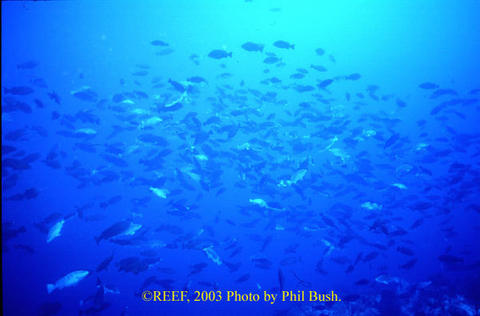In December 2003, legislation was passed to protect grouper spawning aggregations throughout the Cayman Islands over the next eight years. The new legislation succeeds a less stringent policy issued in December 2002 of alternate fishing years and a per boat limit on the number of fish that could be taken from the sites. This decision comes in part because of the Reef Environmental Education Foundation's (REEF) ongoing effort to assess the status of grouper spawning aggregations in the Cayman Islands.
Over the last three years, REEF has worked with the Cayman Islands Department of Environment (CIDOE) to study the Nassau grouper aggregation of Little Cayman's west end. The project, dubbed Grouper Moon, has provided the Cayman Islands with critical data needed to substantiate the current status of the population. Utilizing REEF data as well as corroborating studies from North Carolina State University and CIDOE landings statistics, officials determined that an open fish year, even with restrictions could lead to a collapse of the Nassau grouper population in the Cayman Islands.
Nassau Groupers are long-lived, slow to mature and aggregate at specific times and locations each year making them easy targets for overfishing. These groupers are also known as some of the most charismatic and friendly large fish encountered by divers on a Caribbean reef. The new Cayman Islands legislation will provide a much-needed reprieve for the heavily targeted Nassau grouper. Elsewhere in the Caribbean, Belize and the Bahamas have also enacted similar bans on fishing at aggregation sites.
While some local fishers opposed the recent action, the dive community and local residents applauded the move citing the value of tourism and of a sustainable fishery over the short-term value of a ten-day bounty. REEF's Leslie Whaylen, coordinating the Grouper Moon Project, will be revisiting the site again this February to assess the aggregation and continue to work with the CIDOE to provide critical data needed in their fisheries assessments.
For more information on REEF and the Grouper Moon project, please visit www.reef.org. For more information on the Cayman Islands Department of Environment, visit http://doe.8m.com

